Lead Onion Alternatives
A comparison of 10 Lead Onion alternatives. The analysis covers features, pricing, and performance to help you select the right tool.

You might be using Lead Onion for specific reasons, and that makes sense. The tool performs well in identifying new business opportunities and providing contact information to help you connect with prospects. It certainly has its strengths.
However, some users find the filtering can be complex, and occasional system errors might occur. This can lead to looking for other options. We've identified top alternatives and analyzed their pros and cons to help you shortlist your choices. Let's get started.
Explore Digital Workers With 11x
If your sales operations could benefit from digital workers, consider 11x. The platform lets you deploy autonomous agents to manage functions like research and initial contact.
The 11x go-to-market platform uses AI agents to manage sales. Alice finds prospects, handles outreach on email and LinkedIn, and updates your CRM. Julian qualifies inbound leads and books meetings.
It combines tools for data enrichment, outreach, and email warmup. This consolidation means you do not need multiple separate solutions for these tasks.
Lead Onion Alternatives
We will now examine several Lead Onion alternatives. Each review details pricing, core features, and the pros and cons compared to Lead Onion to help you choose the right tool.
1) ZoomInfo SalesOS
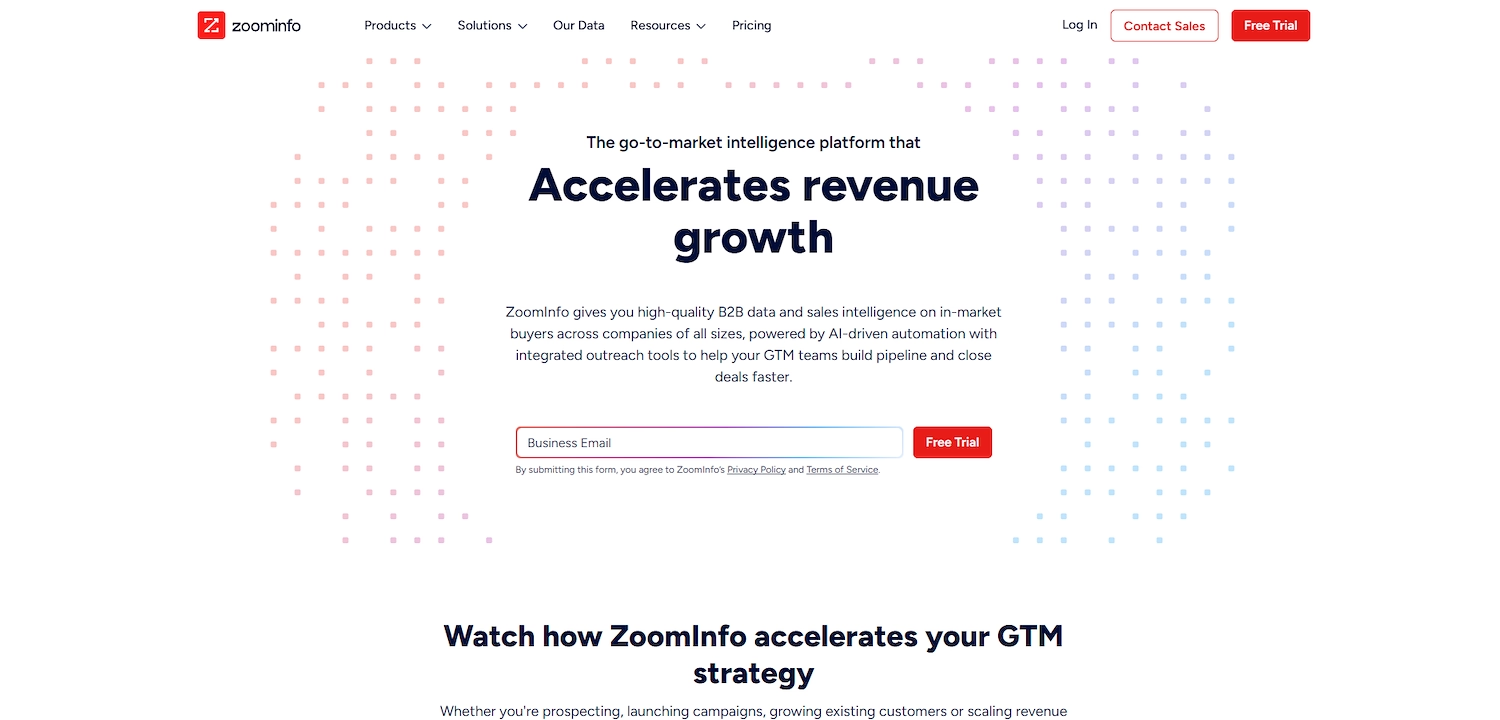
ZoomInfo SalesOS is a go-to-market intelligence platform for B2B organizations. It unifies company data, buyer-intent signals, and automation tools to help teams identify and connect with buyers. The system provides a single source of truth for sales, marketing, and revenue operations.
Users can build prioritized lead lists with verified contact data and identify in-market accounts to generate pipeline through real-time intent signals.
ZoomInfo SalesOS's Main Features
- Analyzes every call and meeting interaction to provide insights.
- Uses a generative-AI companion to surface insights and draft outreach materials.
- Triggers go-to-market activities automatically based on set criteria.
- Uncovers next-best customers and ideal customer profiles through predictive models.
How ZoomInfo SalesOS Compares to Lead Onion
Average Review score: 4.5/5 stars based on 8,738 G2 reviews.
- ZoomInfo SalesOS provides a more extensive and frequently refreshed database of company and contact information than Lead Onion, which can lead to higher data accuracy.
- It includes a generative AI companion, Copilot, to draft outreach materials, offering more direct support for sales activities compared to the prospect identification features in Lead Onion.
- The platform unifies more tools in one place, including conversation intelligence and sales engagement, which may require separate solutions when using Lead Onion.
- This tool uses predictive models to identify ideal customer profiles and potential new customers, a more proactive approach to lead generation than the opportunity identification in Lead Onion.
Where ZoomInfo SalesOS Falls Short
- ZoomInfo SalesOS often requires a larger budget, which may not suit smaller teams that find Lead Onion's pricing more accessible.
- Its comprehensive feature set, while robust, can feel complex for users who only need the core functions that a more specialized tool provides.
- The implementation process can take up to a month, a longer setup period compared to the quicker start some teams experience with other platforms.
Pricing Models and Cost Considerations
While specific pricing for Lead Onion is not publicly available, ZoomInfo SalesOS has a high perceived cost. Both platforms require contacting their sales teams for custom quotes, as pricing depends on factors like team size and feature requirements.
2) Apollo.io
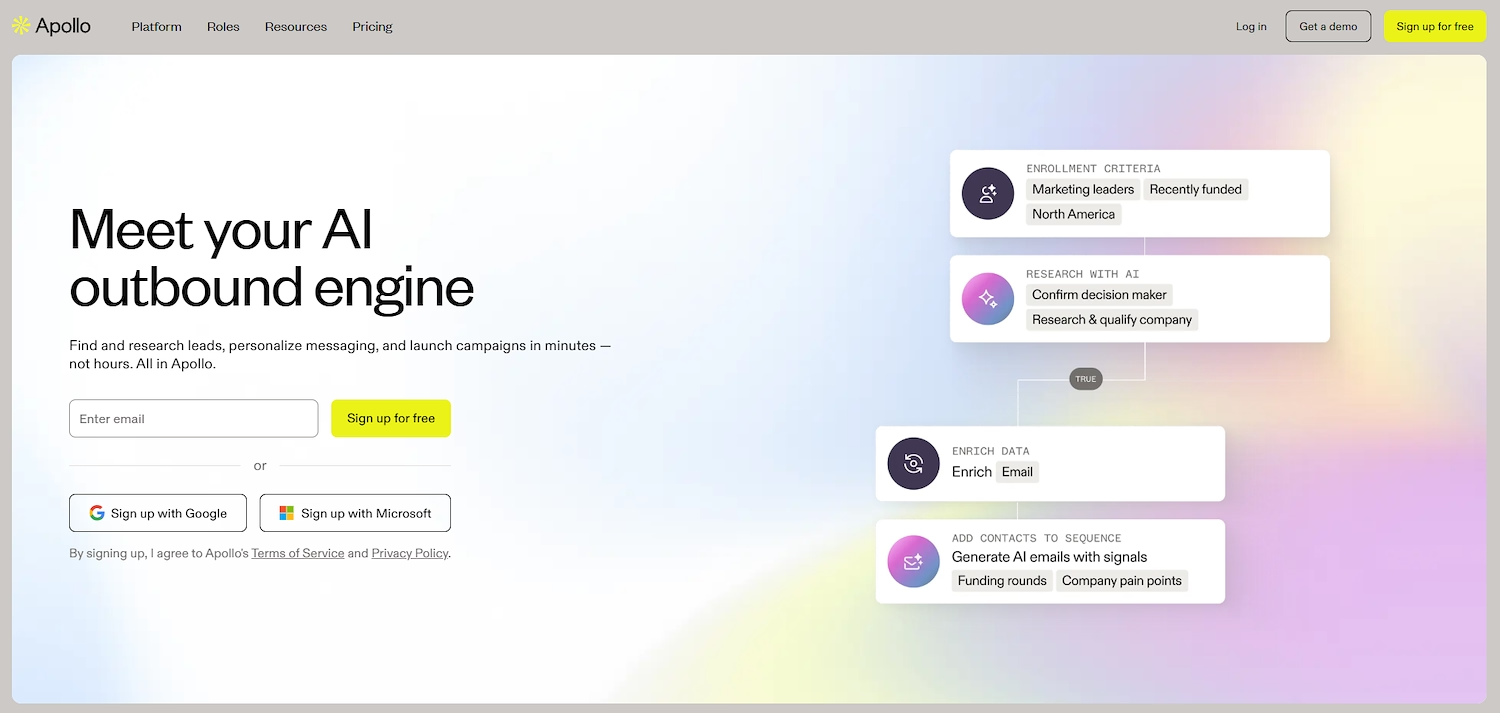
Apollo.io is a sales platform that offers B2B contact data and sales intelligence. It helps teams find prospects with verified information and identify sales triggers. The system combines its database with tools for outreach automation.
Users build targeted lists, use sequences to engage contacts, and get alerts on buyer signals to inform their sales strategy.
Apollo.io's Main Features
- It automates multi-step outreach campaigns using customizable engagement sequences.
- The platform identifies and sends alerts for sales triggers and buyer signals to inform outreach timing.
- It combines a contact database with outreach automation tools within a single platform.
How Apollo.io Compares to Lead Onion
Average Review score: 4.7/5 stars based on 8,904 G2 reviews.
- Apollo.io offers a B2B database with over 210 million contacts. This provides a larger pool for lead generation compared to the opportunity identification features in Lead Onion.
- The platform combines a contact database with outreach automation tools. This integrated approach differs from Lead Onion, which may require separate tools for engagement after prospect identification.
- It has transparent pricing with a free plan available for single users. This is different from Lead Onion, which requires a custom quote and does not publicly list a free option.
- The tool includes an engagement suite to automate outreach sequences. This offers more direct support for sales campaigns than the contact information and opportunity alerts provided by Lead Onion.
Where Apollo.io Falls Short
- Some users report that data from Apollo.io's large database can sometimes be out of date. This may require more verification compared to the real-time opportunity signals that Lead Onion provides.
- The tool provides many features, but some may lack the depth of a specialized solution. For instance, Lead Onion's primary function is visitor identification, which might offer more granular insights than an all-in-one platform.
- Its broad functionality can create a steeper learning curve for teams. Some may find Lead Onion's more focused feature set simpler to implement for identifying immediate sales prospects.
Pricing Plans and Budget Impact
Apollo.io offers transparent pricing with a free plan and paid tiers starting at $49 per user per month. In contrast, Lead Onion’s pricing is available only through a custom quote from their sales team. This makes Apollo.io a more accessible option for teams that prefer predictable costs and want to start without a sales consultation.
3) Cognism
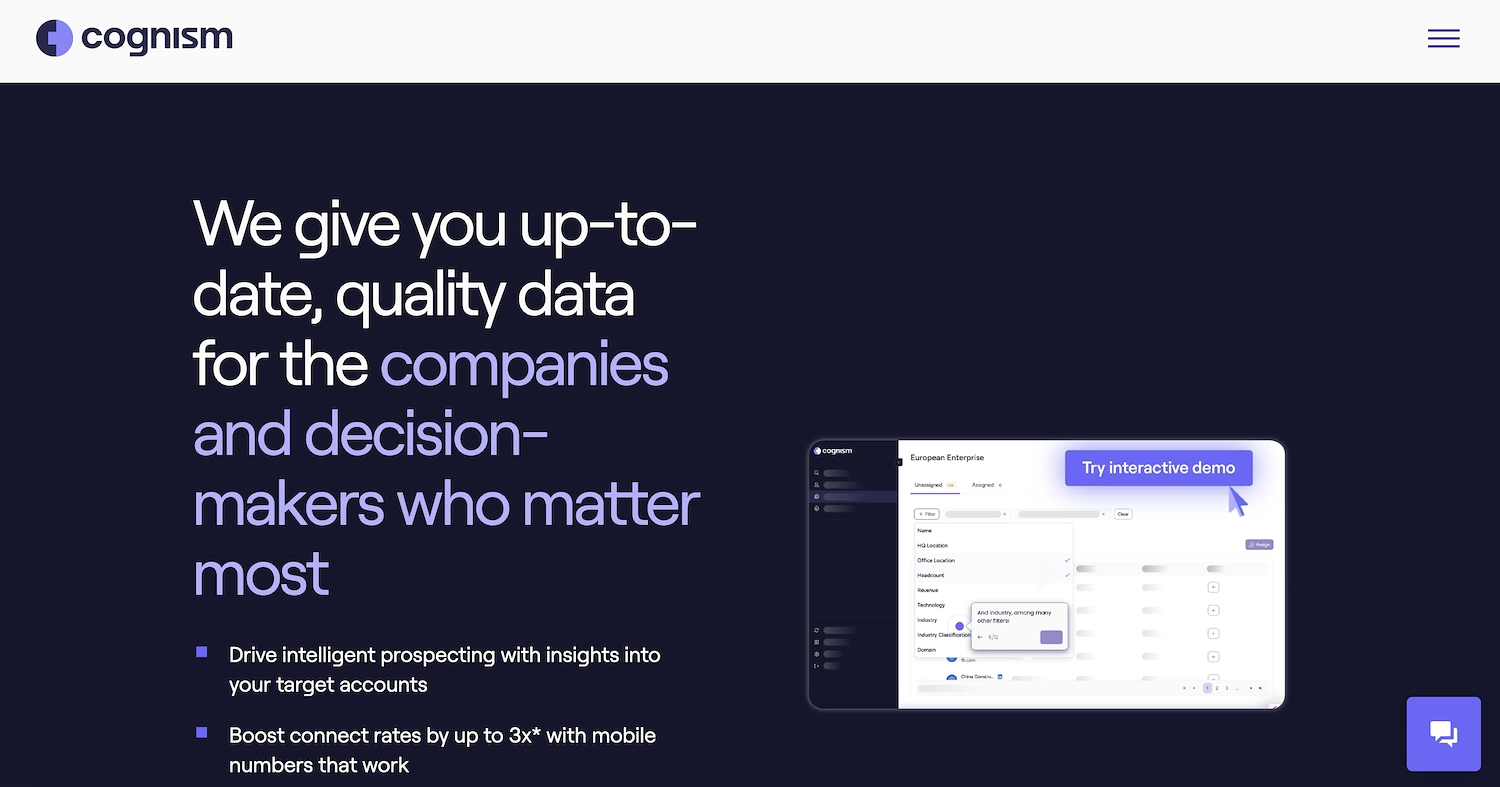
Cognism is a B2B data platform that provides GDPR-compliant contact and company information, with a focus on UK and EMEA markets. It helps revenue teams with its phone-verified Diamond Data® mobile numbers and information on senior decision-makers.
The service allows teams to build outreach lists and enrich CRM records. It also provides signals like funding rounds and technology changes to inform outreach timing.
Cognism's Main Features
- Provides phone-verified, human-checked mobile numbers, known as Diamond Data®, to increase connect rates.
- Surfaces timely buying signals such as hiring trends, funding rounds, and technographic changes for outreach.
- Offers a database of senior-level decision-makers screened against Do-Not-Call lists for compliant outreach.
- Enriches CRM records in bulk through CSV or API to complete, refresh, and scale contact information.
How Cognism Compares to Lead Onion
Average Review score: 4.6/5 stars based on 1,033 G2 reviews.
- Cognism provides GDPR-compliant contact data with a strong focus on UK and EMEA markets. This offers more reliable information for outreach in these regions compared to Lead Onion's broader scope.
- It offers phone-verified mobile numbers, called Diamond Data®, which increases connect rates. This is a different approach to data quality than the standard contact information found in Lead Onion.
- The tool enriches existing CRM records in bulk to complete and refresh contact information. This function differs from Lead Onion, which primarily focuses on identifying new business opportunities.
- This platform surfaces specific buying signals like funding rounds and technology changes. This provides a different type of timely alert for outreach compared to Lead Onion's visitor identification signals.
Where Cognism Falls Short
- Cognism does not provide real-time website visitor identification, a core feature in Lead Onion. Teams that need to identify anonymous website visitors to create leads may find this a significant gap.
- The platform's pricing can be high for some teams. This might make it a less accessible option for smaller businesses compared to Lead Onion, which may offer a more budget-friendly entry point.
- It has a broader feature set that some users say requires more time to learn. In contrast, Lead Onion's focus on opportunity identification can offer a more straightforward user experience for specific needs.
Pricing and Budget Considerations
Both Lead Onion and Cognism require custom quotes, as pricing is not publicly available. User reviews indicate Cognism has a high perceived cost, which may be a factor for smaller teams. For detailed pricing, we recommend visiting Cognism's official website.
4) Lusha
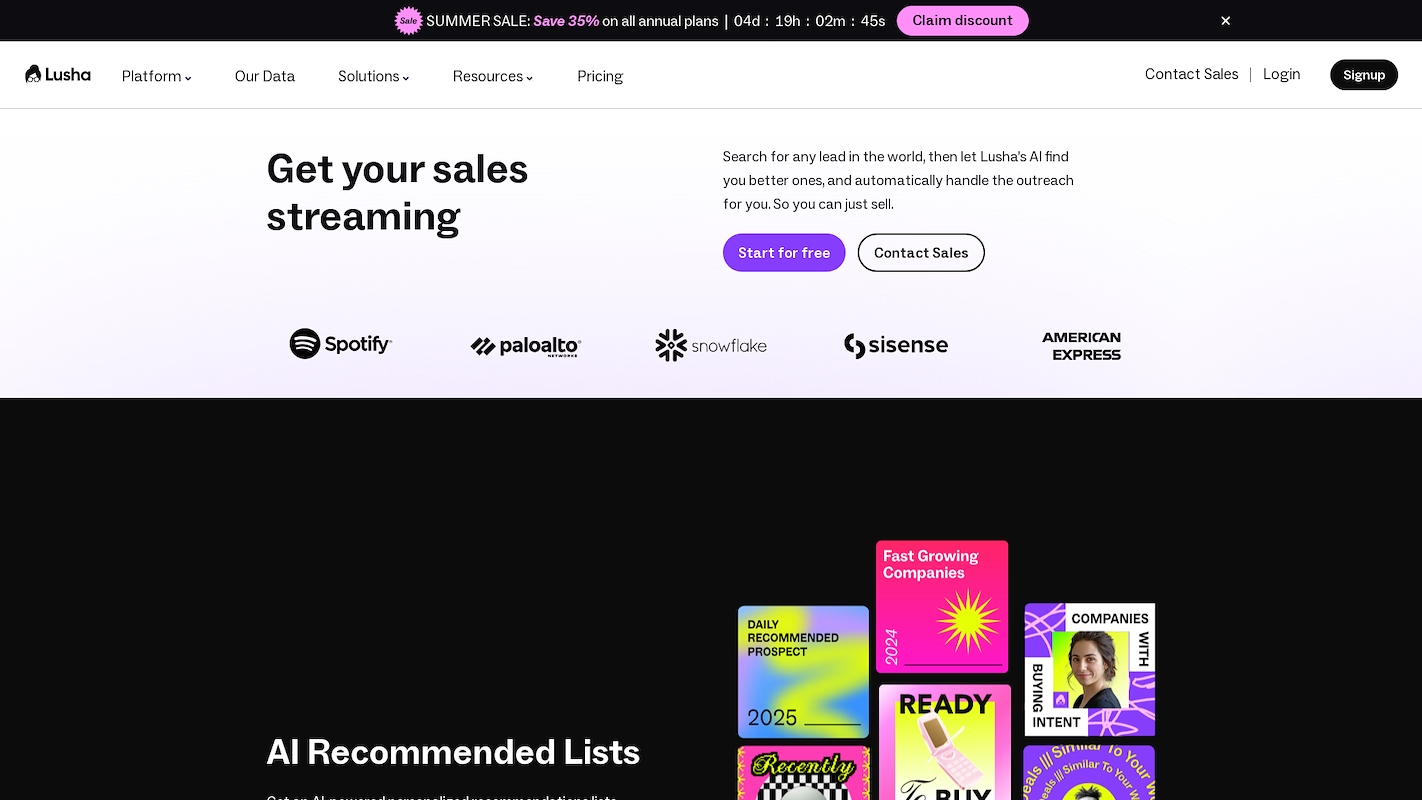
Lusha is a sales intelligence platform with B2B contact and company data. Teams use the tool to find direct dials and verified email addresses for prospects. The system helps users identify key contacts within target accounts and supplies data to support sales outreach.
Lusha's Main Features
- The platform provides AI-recommended lists of companies and decision-makers based on your ideal customer profile.
- It creates live, auto-updating lead lists that continuously add new prospects at user-defined intervals.
- The system automates and personalizes email sequences with copy driven by AI.
- It records and analyzes sales meetings to provide insights into conversations.
How Lusha Compares to Lead Onion
Average Review score: 4.3/5 stars based on 1,516 G2 reviews.
- Lusha provides AI-recommended lists that automatically update with new prospects. This differs from Lead Onion, which identifies opportunities based on website visitor activity.
- It automates and personalizes email sequences with AI-driven copy. This contrasts with Lead Onion, which focuses on providing contact data and may need another tool for outreach.
- The tool has transparent pricing, including a free plan for single users. This makes it more accessible than Lead Onion, which requires a custom quote and has no public free option.
- Its system records and analyzes sales meetings to offer conversation insights. This provides post-contact analysis, while Lead Onion focuses on pre-contact opportunity identification.
Where Lusha Falls Short
- Lusha does not have a real-time website visitor identification feature. This is different from Lead Onion, which allows teams to identify anonymous companies on their website and turn them into leads.
- Some users report that the contact information can sometimes be inaccurate. This may require more verification compared to the real-time opportunity signals that Lead Onion provides.
- The tool's broad feature set might be complex for teams that only need a specialized solution. Lead Onion offers a more focused approach centered on identifying new business opportunities from web traffic.
Pricing Models and Budget Impact
Lusha offers transparent pricing with a free plan and paid tiers starting at $36 per user per month. In contrast, Lead Onion’s pricing is available only through a custom quote. This makes Lusha a more accessible option for teams that prefer predictable costs and want to start without a sales consultation.
5) Seamless.ai
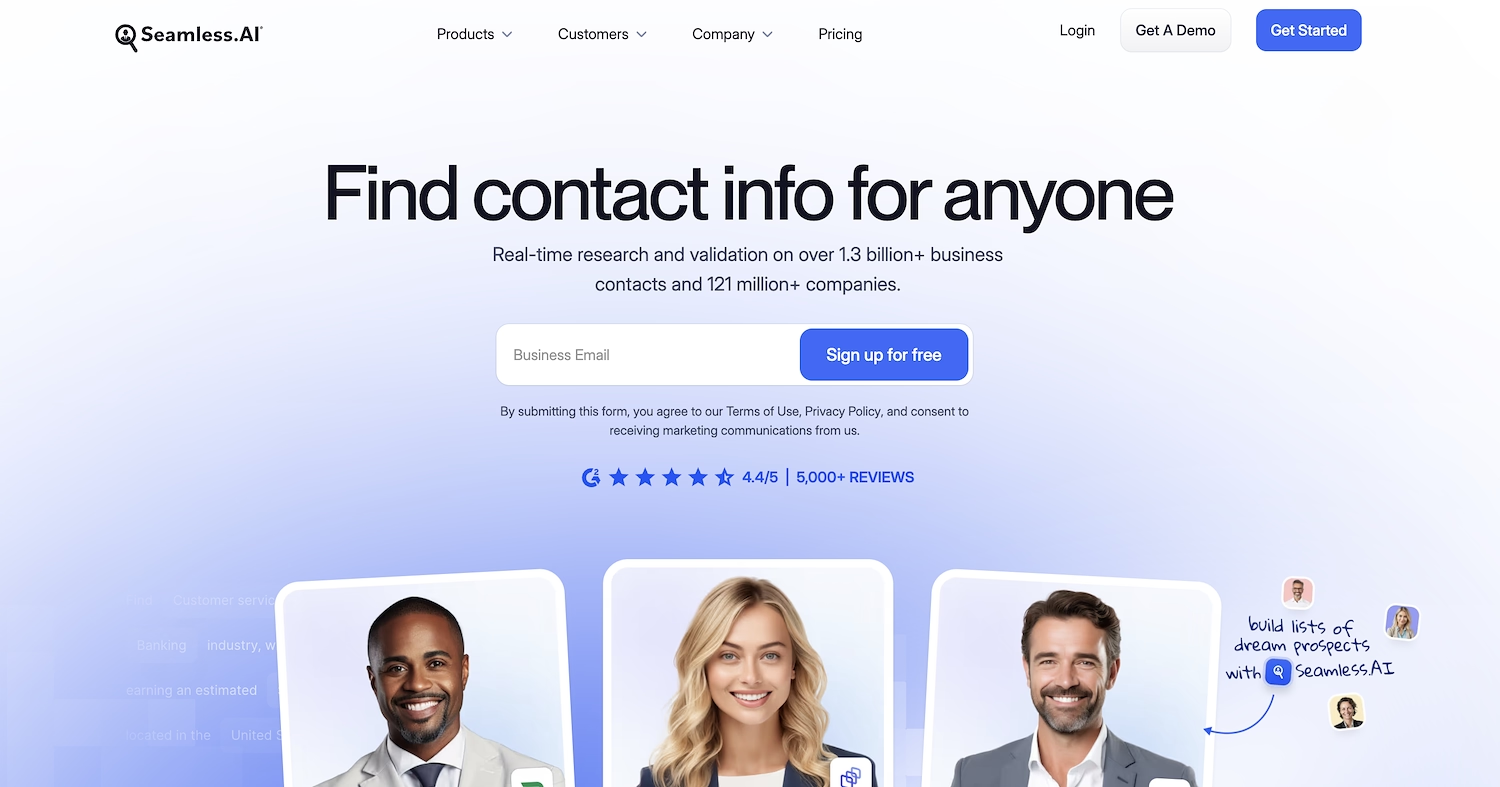
Seamless.ai is a sales intelligence platform that provides B2B contact and company data. Sales teams use the tool to find prospects and build lists with verified information. The system offers sales triggers to help users identify opportunities and connect with decision-makers inside target accounts.
Seamless.ai's Main Features
- Searches a database of over 1.3 billion contacts and 121 million companies to find prospect profiles.
- Detects and alerts on role changes among customers and prospects to capture new contact information.
- Uses AI to generate research and personalized messaging for each prospect.
- Automates list-building workflows to provide continuous pipeline generation.
How Seamless.ai Compares to Lead Onion
Average Review score: 4.4/5 stars based on 5,067 G2 reviews.
- Seamless.ai provides access to a database of over 1.7 billion contacts. This offers a larger pool for prospecting compared to the opportunity identification focus of Lead Onion.
- The tool detects and sends alerts on role changes for customers and prospects. This provides a different type of sales trigger than the website visitor signals from Lead Onion.
- This platform uses AI to generate personalized outreach messages for each prospect. This feature offers direct sales support, while Lead Onion focuses on providing initial contact information.
- It automates list-building workflows for continuous pipeline generation. This proactive approach differs from Lead Onion's method of building lists from website visitor activity.
Where Seamless.ai Falls Short
- Seamless.ai does not offer real-time website visitor identification. This is a core feature in Lead Onion to create leads from web traffic.
- The tool's sales triggers focus on job changes and other broad signals. This is different from Lead Onion, which identifies intent based on a prospect's direct activity on your company website.
- Some users report a learning curve with Seamless.ai due to its extensive features. In contrast, Lead Onion's focused approach can offer a more direct user experience for its specific task.
Pricing and Cost Structure
Both Seamless.ai and Lead Onion require custom quotes and do not list pricing publicly. For the most accurate and up-to-date pricing information, we recommend visiting Seamless.ai's official website, as pricing models can vary significantly between tools.
Consider 11x for Your Sales Team
If you want to add autonomous agents to your sales process, 11x provides digital workers for this purpose. The platform can manage tasks like prospect research and initial outreach. This may be a useful addition to your current sales strategy. See if it aligns with your goals.
At 11x, our AI runs your sales process. Alice finds accounts, enriches data, and starts outreach. Julian handles calls, qualifies leads, and books meetings. We combine intent signals and email warmup in one platform, so you don't need extra tools or hires.
Book a demo to see it in action.
6) Clearbit
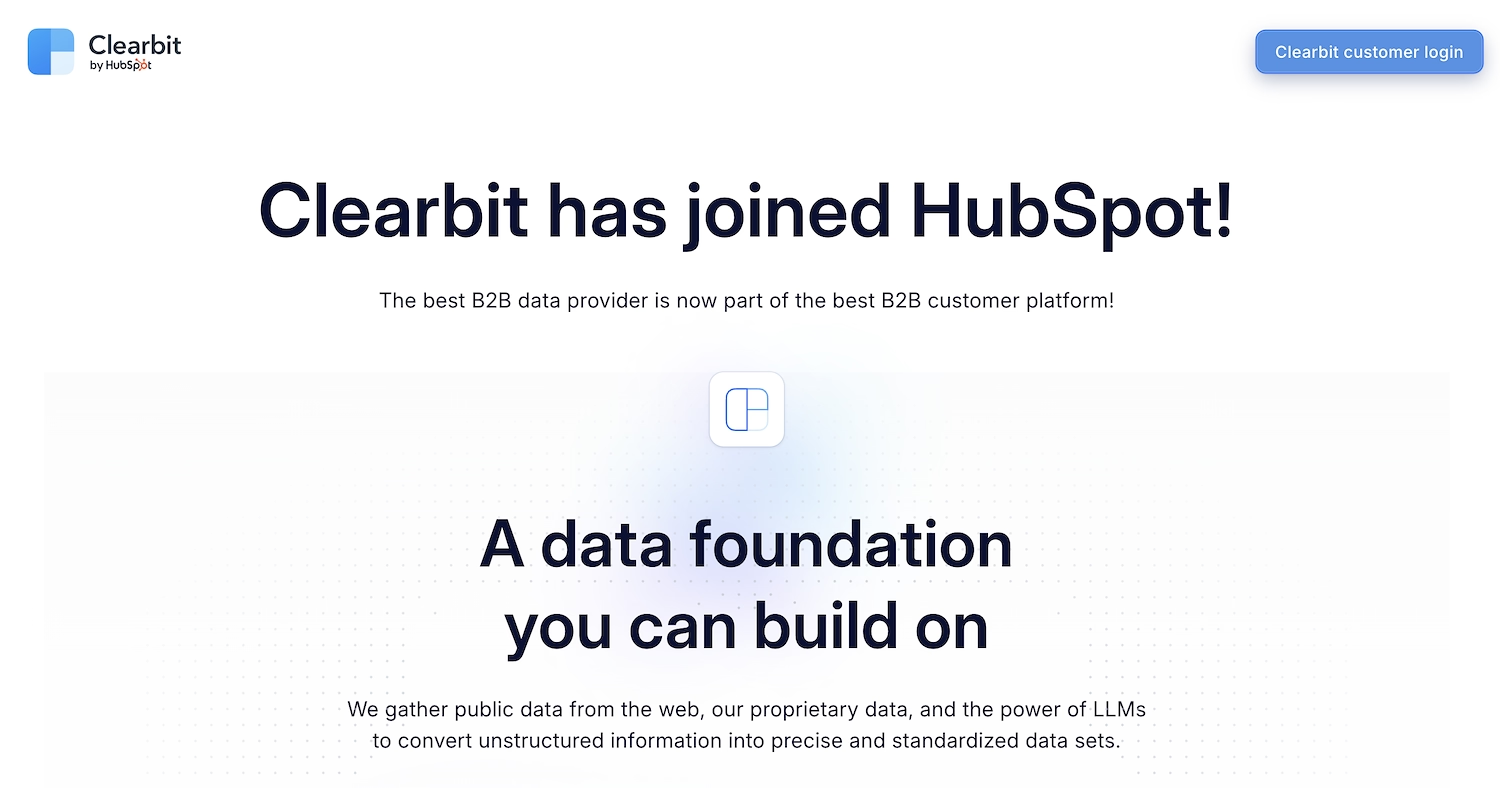
Clearbit is a data platform for go-to-market teams. It identifies anonymous website visitors and enriches contact records with company and role information. This data helps sales teams understand prospects and receive alerts for accounts that show purchase intent.
Clearbit's Main Features
- The platform aggregates public web data and proprietary sources and applies LLM techniques to create standardized datasets.
- It supplies data points for real-time lead scoring, including 6-digit NAICS codes and corporate hierarchy maps.
- The system shortens web forms dynamically by removing fields it can enrich automatically to increase conversion rates.
- It enriches every lead, contact, and account record with firmographic and demographic details to build a complete data profile.
How Clearbit Compares to Lead Onion
Average Review score: 4.4/5 stars based on 626 G2 reviews.
- Clearbit enriches records with over 100 data points, including firmographic and demographic details. This differs from Lead Onion, which focuses on identifying new business opportunities from website visitors.
- The platform can dynamically shorten web forms by auto-filling fields it already knows. This feature helps increase conversion rates, a different benefit compared to Lead Onion's focus on generating leads from anonymous traffic.
- It uses machine learning and quality assurance teams to maintain fresh business data. This provides a different method for data accuracy compared to the real-time visitor activity signals that Lead Onion uses.
- The tool offers deep integration with CRMs like HubSpot to automate workflows. This provides a more integrated data foundation within your existing systems than Lead Onion's opportunity identification alerts.
Where Clearbit Falls Short Compared to Lead Onion
- Clearbit sometimes requires a one-month implementation period and has a high perceived cost. This can be a challenge for smaller teams that need a faster, more accessible solution, which Lead Onion may provide.
- The platform focuses heavily on data enrichment to build detailed company profiles. In comparison, Lead Onion centers on identifying specific sales opportunities from web traffic, which some teams find is a more direct path to generating new leads.
- Its comprehensive feature set for data enrichment can feel complex for teams with a singular goal. Lead Onion offers a more focused user experience centered only on opportunity identification, which can be simpler for teams to adopt for that specific task.
Pricing Models and Cost Analysis
Both Lead Onion and Clearbit require custom quotes, as neither provides public pricing. User reviews indicate Clearbit has a high perceived cost, which may be a factor for smaller teams. For the most accurate pricing information, we recommend visiting Clearbit's official website.
7) SalesIntel
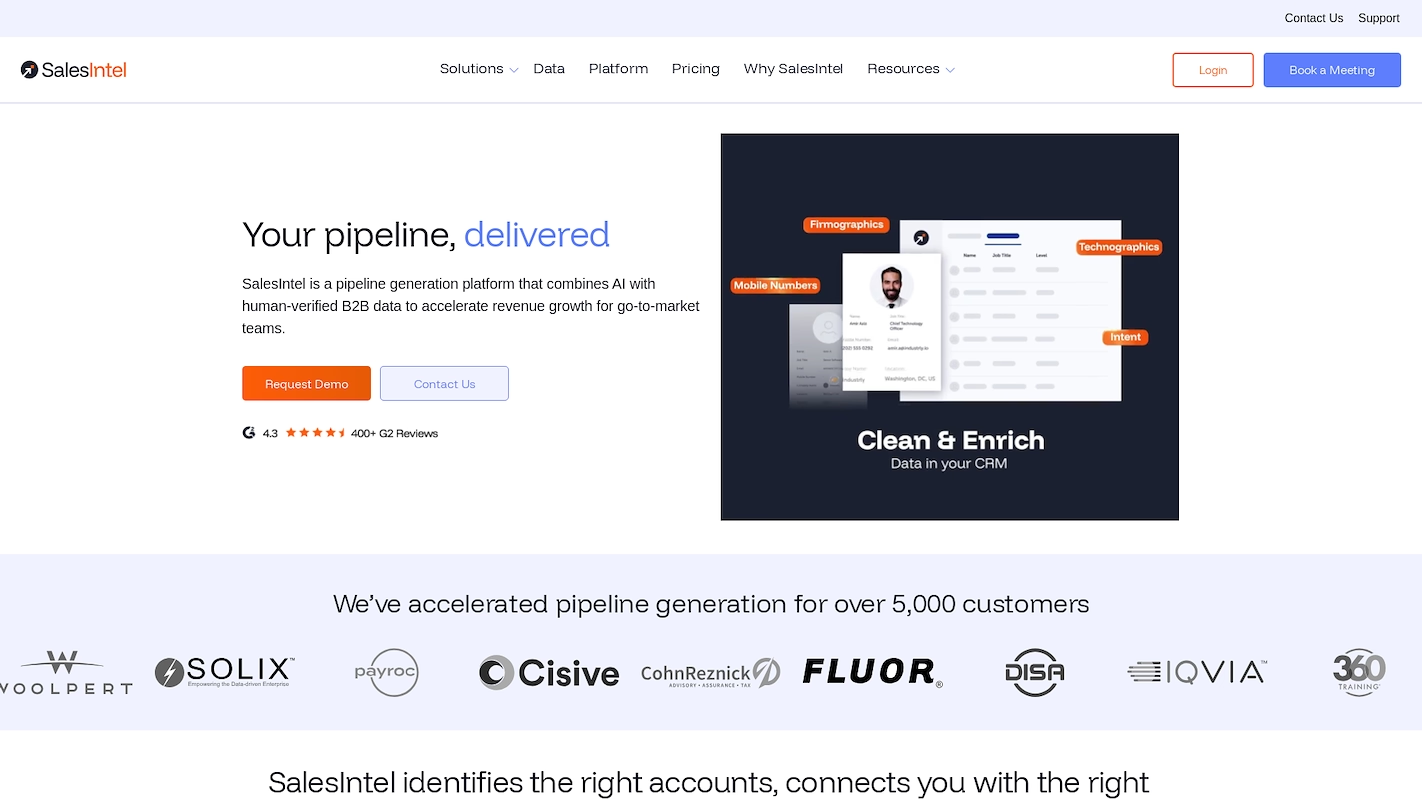
SalesIntel is a sales intelligence platform that provides B2B data for revenue teams. It offers company and contact information, plus sales triggers, to help users find opportunities, connect with prospects, and support go-to-market strategies.
SalesIntel's Main Features
- Offers human-verified B2B data with 95% accuracy for emails and mobile numbers, plus a research-on-demand service for missing contacts.
- Builds an evidence-based ideal customer profile to prioritize accounts that fit specific characteristics.
- Deploys AI agents to automate workflows such as signal monitoring, task routing, and preparing outreach.
- Enriches form submissions automatically with full contact data to complete lead profiles.
How SalesIntel Compares to Lead Onion
Average Review score: 4.3/5 stars based on 462 G2 reviews.
- SalesIntel provides human-verified data with a 95% accuracy rate, a different approach to data quality compared to the opportunity signals Lead Onion identifies.
- It offers a research-on-demand service to find contact information that is not in its database, a feature not available in Lead Onion.
- The tool uses AI agents to automate workflows like signal monitoring, which offers a different type of automation than Lead Onion's visitor identification.
- This platform builds an evidence-based ideal customer profile to prioritize accounts, a proactive method that differs from Lead Onion's reactive approach based on web traffic.
Where SalesIntel Falls Short
- SalesIntel's visitor identification module sometimes has limited depth. This is different from Lead Onion, whose primary function is to identify anonymous website visitors and create leads in real time.
- The tool's focus on verified contact data does not always reflect the immediate buying intent that Lead Onion captures from website activity. As a result, these leads might need more qualification.
- Some users note the implementation process for SalesIntel can take up to a month. This is a longer setup period compared to the quicker start some teams have with a more specialized tool like Lead Onion.
Pricing and Cost Comparison
While we've covered key features and use cases in this comparison, pricing models can vary significantly between tools. For the most accurate and up-to-date pricing information, we recommend visiting SalesIntel's official website.
8) UpLead
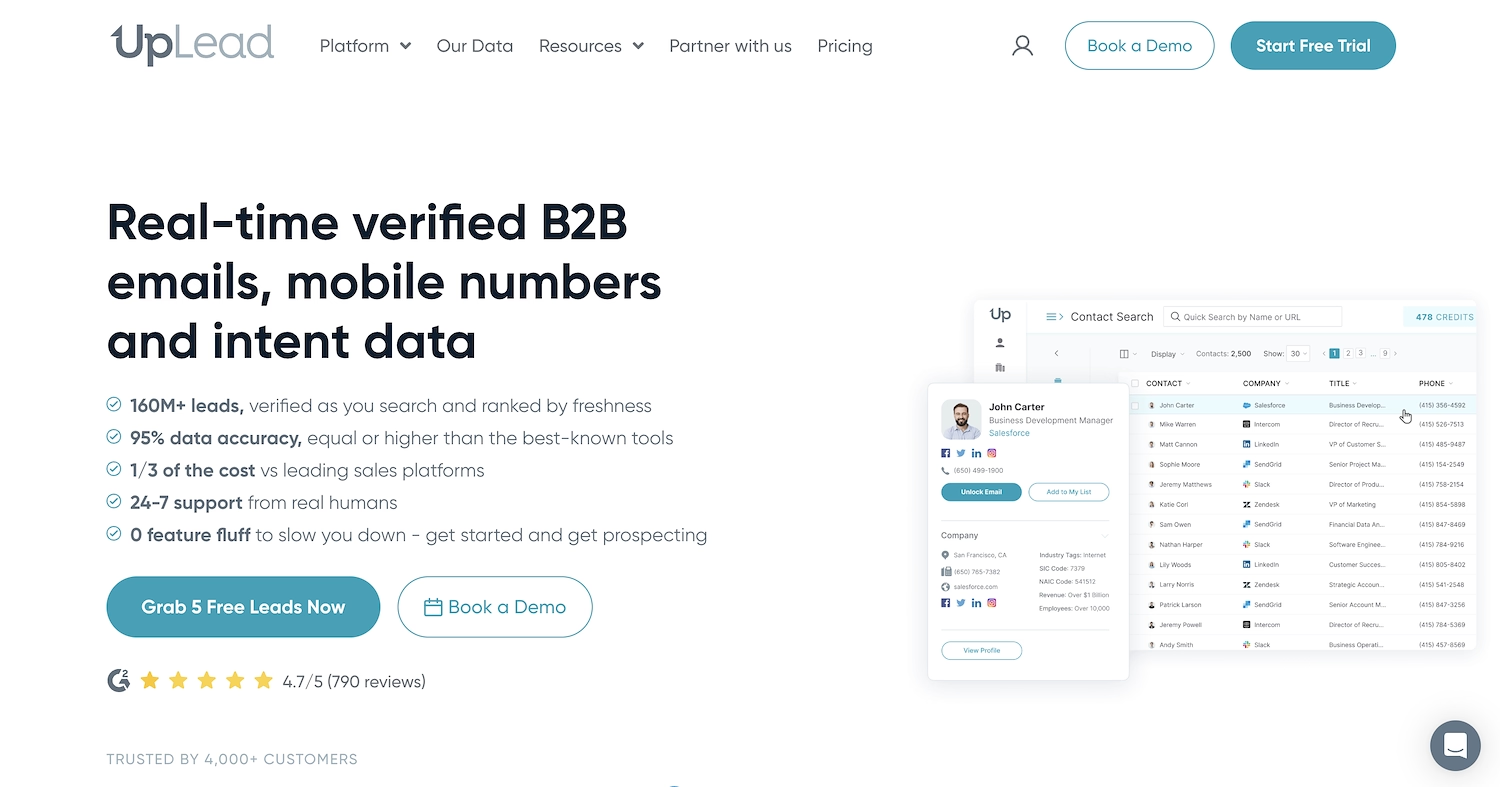
UpLead is a B2B data provider with a 95% data accuracy guarantee. Sales teams use it to build prospect lists with verified contact information. The service identifies companies that show purchase intent and provides technographic details to find leads based on the software they use.
UpLead's Main Features
- Offers real-time email verification with a 95% data accuracy guarantee.
- Uses over 50 search filters, including intent data, to find in-market buyers.
- Provides technographic details to find leads based on the software they use.
- Integrates with Salesforce, HubSpot, and other CRMs to automate workflows.
How UpLead Compares to Lead Onion
Average Review score: 4.7/5 stars based on 797 G2 reviews.
- UpLead offers a 95% data accuracy guarantee on its contact information. This provides a different type of data reliability compared to the opportunity signals from Lead Onion's website visitor tracking.
- The platform provides over 50 search filters, including technographics. This allows users to build lists based on the software a company uses, a different approach than Lead Onion's visitor identification.
- It includes real-time email verification to confirm contact data is current. This is a data quality feature, while Lead Onion focuses on identifying the companies that visit your website.
- This tool uses intent data to find in-market buyers. This differs from Lead Onion, which identifies intent based on a prospect's direct activity on your own website.
Where UpLead Falls Short Compared to Lead Onion
- UpLead does not identify anonymous companies visiting your website. This is different from Lead Onion, which creates leads directly from your site's traffic, showing immediate interest.
- The tool's intent data shows general market interest, not direct engagement with your site. In comparison, Lead Onion's signals come from prospects actively exploring your own web pages.
- Its lead generation process is based on building lists from a database. This approach may miss timely opportunities from prospects who are already on your website, a core function of Lead Onion.
Pricing and Cost-Effectiveness
UpLead offers transparent pricing with a free trial and paid plans starting at $99 per month. In contrast, Lead Onion requires a custom quote. This makes UpLead a more accessible option for teams that prefer predictable costs and want to start without a sales consultation.
9) Demandbase
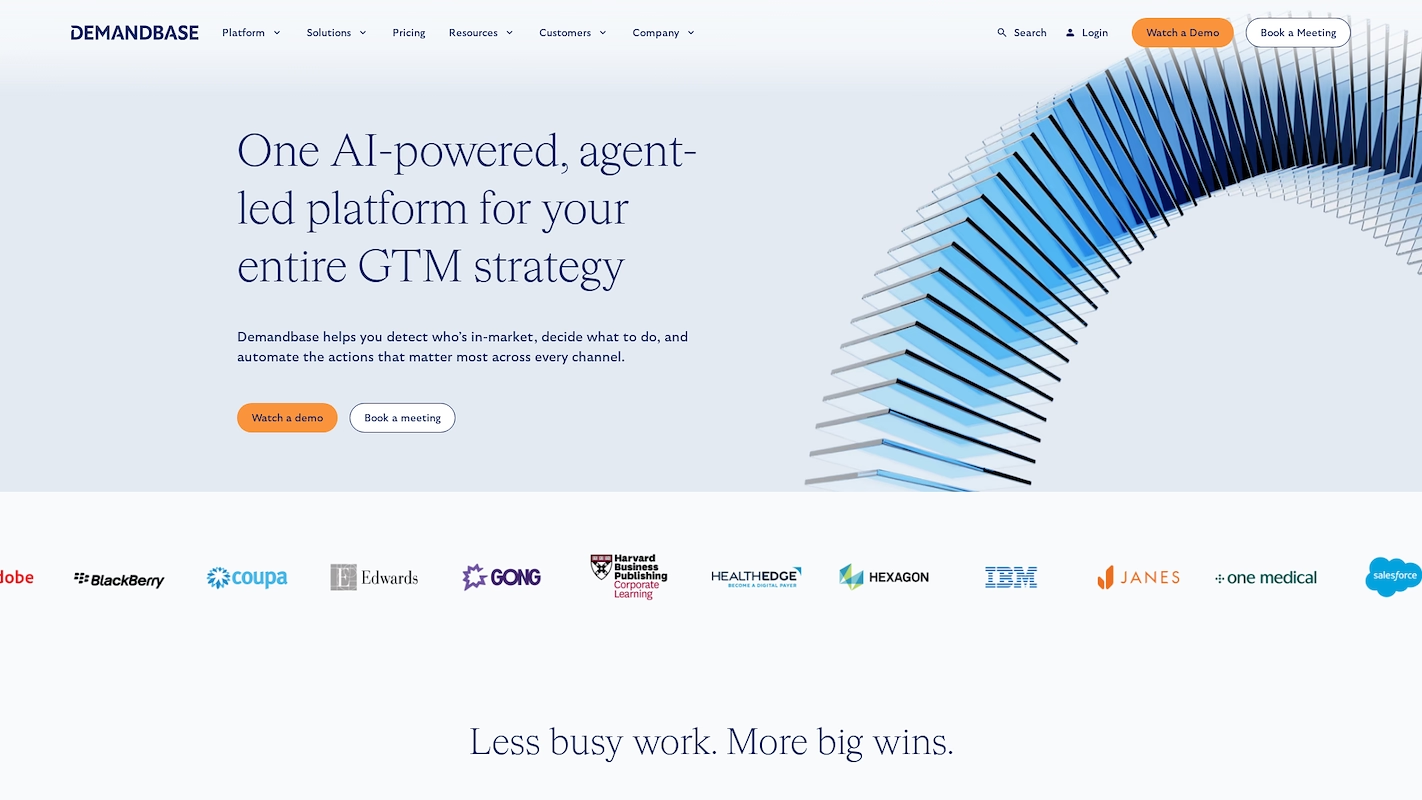
Demandbase is a go-to-market platform that provides account intelligence for B2B teams. It helps sales and marketing find, engage, and close target accounts. The system identifies which companies are in-market and surfaces intent signals to guide outreach and personalize the buyer experience.
Demandbase's Main Features
- Provides account-level insights to identify target companies.
- Cleans and enriches existing records for data accuracy.
- Integrates with CRM and marketing automation platforms.
- Offers lead intelligence to support sales activities.
How Demandbase Compares To Lead Onion
Average Review score: 4.4/5 stars based on 1,843 G2 reviews.
- Demandbase provides an account-based advertising platform to target specific companies. This is a more direct engagement tool compared to Lead Onion, which identifies opportunities but requires other tools for advertising.
- It unifies sales and marketing actions across different channels through its orchestration platform. This offers a more coordinated approach than Lead Onion, which focuses on lead identification from web traffic.
- The tool cleans and enriches existing CRM data with detailed account intelligence. This creates a more complete view of the account compared to Lead Onion's focus on identifying new, anonymous visitors.
- This platform delivers holistic account views with firmographic dashboards. This gives teams a deeper understanding of target accounts than the visitor-level data provided by Lead Onion.
Where Demandbase Falls Short
- Demandbase has a broad feature set that some users find complex. This can lead to a steep learning curve compared to Lead Onion's more focused approach on opportunity identification.
- The platform sometimes requires a longer implementation period, which can take up to two months. This is different from Lead Onion, which may offer a quicker setup for teams that need immediate visitor identification.
- Its focus is on account-level intelligence for a list of target companies. This differs from Lead Onion, which specializes in identifying anonymous companies visiting your website and turning them into immediate leads.
Pricing and Budgetary Impact
Both Lead Onion and Demandbase require custom quotes, as neither lists pricing publicly. User reviews indicate Demandbase has a high perceived cost, which can be a factor for some teams. For detailed pricing, we recommend visiting Demandbase's official website.
10) Bombora
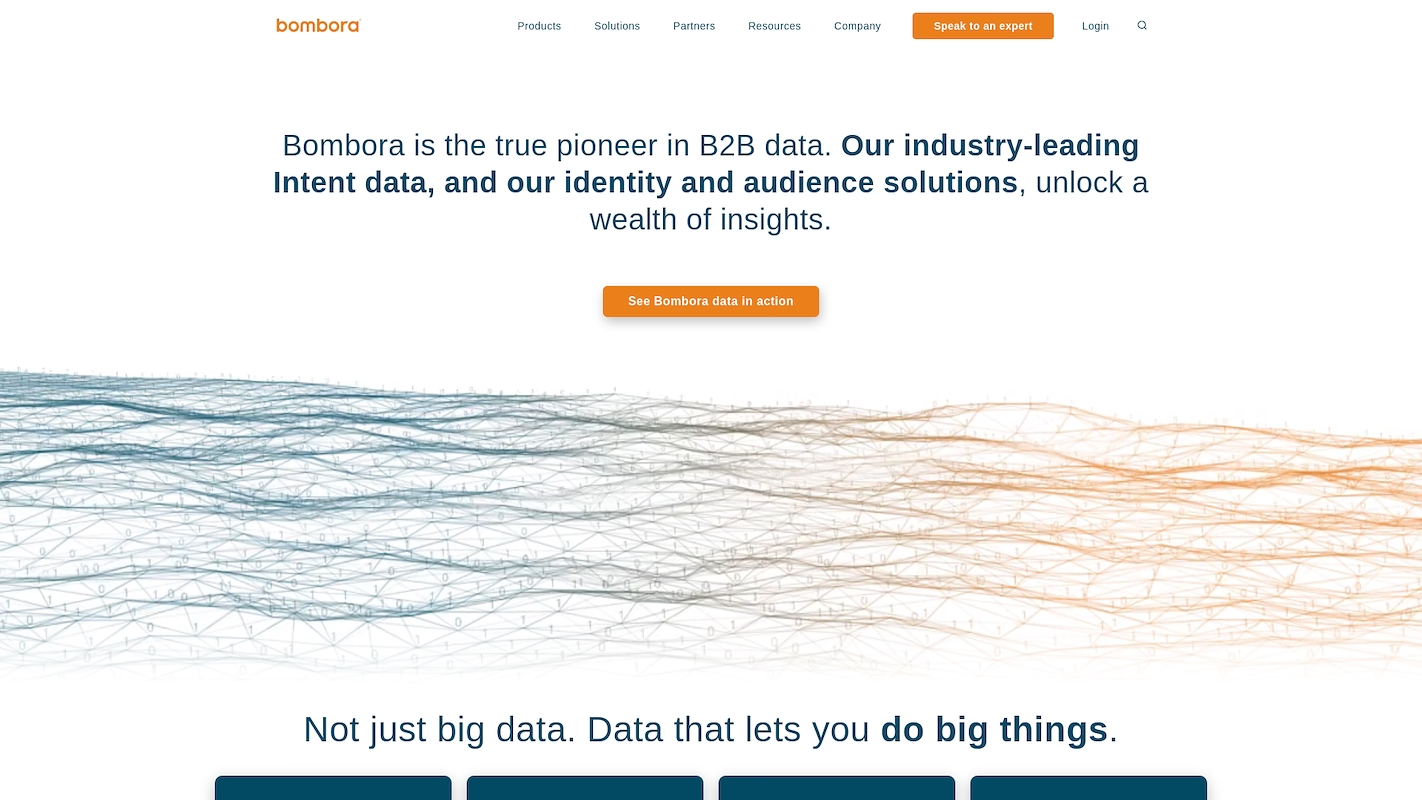
Bombora provides B2B intent data to identify which businesses show purchase intent. It collects data from a cooperative of websites to understand the topics companies research online. Teams use these account-level signals to prioritize outreach and find in-market buyers, rather than focus on individual leads.
Bombora's Main Features
- Provides account-level insights that identify which businesses are researching specific topics online.
- Offers data segmentation and filtering to prioritize accounts based on the intensity of their research signals.
- Gathers market insights on content consumption from a cooperative of B2B media websites.
- Integrates with CRM and marketing automation platforms to use intent data within existing workflows.
How Bombora Compares To Lead Onion
Average Review score: 4.4/5 stars based on 155 G2 reviews.
- Bombora provides account-level intent data from a cooperative of B2B websites. This offers a broader market view than Lead Onion, which shows intent from visitors on your site alone.
- It identifies which businesses research specific topics across the web. This differs from Lead Onion's focus on the anonymous companies that land directly on your web pages.
- The platform helps you prioritize accounts based on their research intensity across many topics. This is a different approach from Lead Onion, which prioritizes leads that show immediate interest through a site visit.
- The tool gathers market insights from a large cooperative of B2B media sites. This method provides a wider signal range than the first-party visitor data from Lead Onion.
Where Bombora Falls Short Compared to Lead Onion
- Bombora shows general topic interest from a wide network of sites. In contrast, Lead Onion identifies companies that visit your website, which signals more direct interest in your specific products or services.
- The tool provides account-level data, so sales teams may need to do more research to find the right contact. Lead Onion focuses on providing the contact information needed to connect with prospects.
- Its intent signals are broad and can require more qualification from sales teams. Lead Onion's leads come from your own site traffic, so they often represent more immediate and qualified opportunities.
Pricing and Cost Considerations
Both Lead Onion and Bombora require custom quotes, as neither lists pricing publicly. User reviews indicate Bombora has a high perceived cost, which can be a factor for some teams. For detailed pricing, we recommend visiting Bombora's official website.
Which One Should You Go With?
Choosing a Lead Onion alternative depends on many variables, from budget to specific feature needs. This guide reviewed several options to help you compare platforms and inform your decision.
If you want to add autonomous agents to your sales process, 11x provides digital workers for this purpose. The platform manages tasks like prospect research and initial outreach, which may be a useful addition to your current sales strategy. See if it aligns with your goals.




